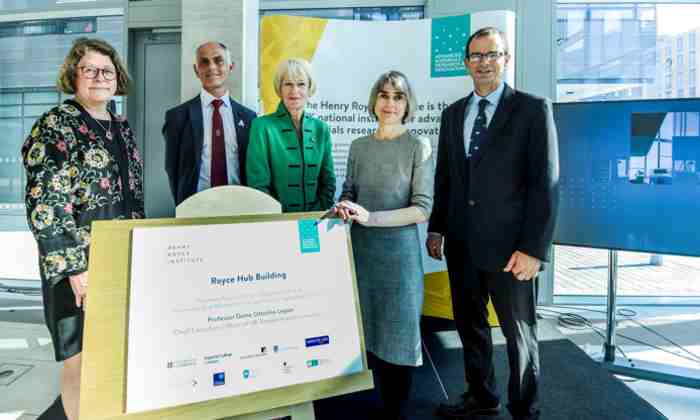Professor Dame Ottoline Leyser opens our Henry Royce Institute Hub Building
07 Sep 2021
CEO of UK Research and Innovation (UKRI) launches home to 400 researchers, PhD Students and professional services staff and £45 million of state-of-the-art equipment, driving research and innovation in advanced materials

Professor Dame Ottoline Leyser, CEO of UK Research and Innovation (UKRI) has officially opened our £105m Henry Royce Institute Hub Building.
Our President and Vice-Chancellor, Professor Dame Nancy Rothwell and Dame Julia King, the Baroness Brown of Cambridge and Chair of the Henry Royce Institute, welcomed guests to Royce’s flagship building at our University and set out the capabilities of the new UK centre for materials research and meeting place for the advanced materials community.
Following a tour of the building’s laboratories and meeting researchers, Dame Ottoline unveiled a plaque marking the official opening of the Royce Hub Building, which will be the hub to 400 researchers, PhD Students and professional services staff driving research and innovation in advanced materials.
The event also saw an important keynote video message from, The Rt Hon Kwasi Kwarteng MP, Secretary of State for Business Energy and Industrial Strategy, who highlighted the importance of Government investment in innovation and technology translation. The Business Secretary noted that Advanced Materials and Manufacturing is a key technology family of “UK strength and opportunity”, as highlighted in the Government’s recently announced UK Innovation Strategy: Leading the future by creating it.
The building hosts £45 million of new state-of-the-art equipment alongside existing facilities in Manchester for biomedical materials, metals processing, digital fabrication, and sustainable materials research, including the new Sustainable Materials Innovation Hub part-funded by the European Regional Development Fund (ERDF). Alongside this is a variety of collaboration spaces for industry engagement, helping to accelerate the development and commercialisation of advanced materials.
During the event, Carol Holden OBE, from the Northern Automotive Alliance presented on the Royce role in industrial innovation and Mia Maric, winner of IOM3 Young Person’s Lecture Competition talked about her Manchester PhD experience and the benefits of using Royce’s equipment and expertise in her research.
The Royce Hub Building in Manchester sits at the centre of the Institute’s national Partnership with eight other leading institutions – the universities of Cambridge, Imperial College London, Liverpool, Leeds, Oxford, Sheffield, the National Nuclear Laboratory, and UKAEA.
Professor Dame Ottoline Leyser said: “The Henry Royce Institute will play a key role in the UK’s research and innovation ecosystem, bringing together industry and academia to connect innovation and discovery in advanced materials, and develop the material science skills needed for the innovation economy.
“This Institute will deliver impact across the UK – from the new materials needed to realise our Net Zero ambitions to novel biomaterials for personalised medicine.”
Professor Dame Nancy Rothwell said: “We were delighted to welcome Dame Ottoline to the new Royce Hub building, to officially mark its much-anticipated opening and to cement the building’s role as a centre of scientific excellence and a key asset for Manchester and the UK’s industrial prosperity and success.”
The Royce Hub Building and new equipment totalling £150 million forms part of the wider £235m investment by the Engineering & Physical Sciences Research Council part of UK Research and Innovation across Royce’s national partnership. Investment has also be made by The Wolfson Foundation to support the biomedical materials facility within the building, alongside ERDF funding for the SMI Hub, representing a wider investment of C. £330 million.
Royce’s presence in Manchester extends well beyond the new building; it also has substantial space and equipment in the Alan Turing Building, along with facilities in the National Graphene Institute, Manchester Institute of Biotechnology and at the Dalton Nuclear Institute. Soon it will also extend its reach into the new Manchester Engineering Campus Development – the MECD – which is the single largest home for engineering in any UK university.
